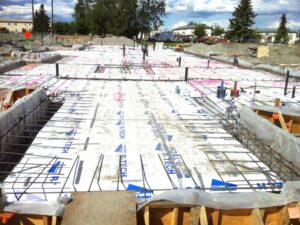 Expanded polystyrene (EPS) insulation has the highest R-value per dollar of rigid foam insulations. Unlike other options, EPS retains its R-value throughout its service life, ensuring a cost-effective and long-lasting solution for below grade, floor, wall, and roof insulation.
Expanded polystyrene (EPS) insulation has the highest R-value per dollar of rigid foam insulations. Unlike other options, EPS retains its R-value throughout its service life, ensuring a cost-effective and long-lasting solution for below grade, floor, wall, and roof insulation.
But the benefits don’t stop with high and stable R-values. EPS rigid foam insulation also installs efficiently, saving roofing contractors time and building owners money. When it comes to roofing insulation for areas with extreme weather, EPS performs better than other rigid foams, including polyisocyanurate (polyiso). EPS is versatile and lightweight, so it can be used from the roof to below the basement floor.
These benefits move beyond R-value to provide roofing contractors, building owners and homeowners a substantial incentive to use EPS foam insulation for their next insulation project.
1. Expanded polystyrene installs efficiently for reduced labor cost
EPS insulation is available in several forms, from flute fills to fanfold panels. For commercial projects, these specialty products reduce the time needed to modify standing seam roof decks and install multiple layers of insulation. In fact, these products can decrease the labor hours needed for a roofing installation project by up to 60 percent to provide a substantially lower bottom line.
This not only allows contractors to finish projects more quickly and without delays caused by skilled labor and material shortages in the construction industry but also mitigates the costs associated with installation.
2. Insulation upgrades may qualify a home renovation for climate tax breaks
According to the Inflation Reduction Act, some homeowners may qualify for up to $1,200 in tax credits by upgrading their home’s insulation. These credits work in conjunction with reduced monthly utility bills from having better insulation to provide homeowners with substantial savings. Further, because rigid foam insulation is easy to install, it can help home insulation upgrades become enjoyable DIY projects, decreasing the upfront costs and complication of shoring up energy leaks throughout a home.
From DIY attic insulation kits to garage door kits and basement and wall insulation, EPS can be installed with basic tools anywhere a home’s insulation needs upgrading. This means homeowners can start their energy efficiency upgrades immediately while they research other ways to reduce their home’s carbon footprint and maximize potential tax benefits.
3. Expanded polystyrene has a stable performance rating for better roof insulation
While polyiso does have a higher R-value than EPS in normal conditions, this value begins to rapidly deteriorate around 60 degrees Fahrenheit (F). On the other hand, EPS’ R-value is stable not only throughout its service life but across temperature changes, which make it a better choice for areas that experience cold temperatures in the winter or year-round.
To put this in context, if a polyiso roofing insulation assembly were tested during a Chicago winter, it would lose approximately 30 percent more heat than an EPS assembly of the same thickness.
4. Expanded polystyrene can be used throughout the building envelope
Another additional benefit to EPS’ stable R-values is that it can be used from the attic to below the basement floor. This means contractors, project owners and DIYers do not have to use different materials to create a fully insulated building envelope. As such, EPS reduces the amount of time that may be lost to switching products, differing lead times and other complications that can occur when a project needs multiple materials for completion.
Additionally, homeowners can take advantage of EPS’ versatility by using it throughout their homes for an easy and cost-effective means to shore up energy drains.
The insulation that keeps giving
EPS insulation can contribute to more efficient buildings, whether they are commercial or residential. With a stable and highest-per-dollar R-value, this product can help buildings comply (and even exceed) code-driven insulation requirements. It can also now help homeowners claim tax credits by helping to shore up energy drains in their homes. And because it can be easily installed, EPS can help contractors cut labor costs substantially.
To learn more about the benefits of EPS insulation, check out Insulfoam’s blog post: Design & Cost Advantages of EPS (Expanded Polystyrene) Rigid Insulation.





